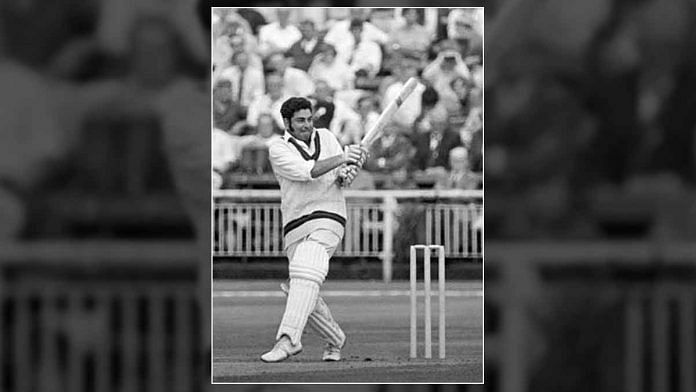New Delhi: Long before Indian cricket became sexy, Farokh Engineer, a prodigious talent with both bat and gloves, proved to be one of the greatest entertainers of the game.
On his 81st birthday, ThePrint remembers the exploits of former Indian swashbuckling wicketkeeper-batsman during the sixties and seventies.
Competition from Budhi Kunderan
Born on 25 February 1938 in Bombay (now Mumbai), Farokh Maneksha Engineer completed his education from Don Bosco High School and Podar College — the college which also produced other Indian cricket stars, including Dilip Vengsarkar, Sanjay Manjrekar and Ravi Shastri.
Engineer played his debut first-class match in December 1958 for the Combined Universities side against the touring West Indies.
His international Test debut came three years later against England at Kanpur in December 1961.
At the beginning of his career, Engineer’s place in the team was not a given. He faced stiff competition from wicketkeeper-batsman Budhi Kunderan.
In 1961, Engineer played four of the five matches against the visiting English team. However, during India’s tour to West Indies in 1961-62, Engineer played three matches while Kunderan played only two.
The game of musical chairs between the two continued till 1966-67, when Kunderan packed his bags and settled in Scotland.
Also read: Remembering Chuni Goswami, the football legend who also played Ranji Trophy
International career
In 1967, Engineer’s third test against the West Indies at Chepauk Stadium, Madras (now Chennai) turned out to be what writer John Cantrell in his book Farokh Engineer: From the Far Pavilion called his “finest hours”.
Opening the innings, Engineer scored a scintillating 109 in the first innings against the likes of pacers Wes Hall and Charlie Griffith to help India reach a total of 404 runs. Pity, the match ultimately ended only in a draw.
Engineer then played a major role in India’s first Test series victory in New Zealand in 1968. He managed to score over 300 runs at an average of 40.12 in the four-match series.
Three years later, Engineer was a part of Ajit Wadekar-led historic 1-0 Test series win against England on their turf. Engineer scored a total of 172 runs in the series at an average of 43.
Engineer played his last Test in 1975 against the fierce West Indies side. Unfortunately, he scored a pair in that match.
In his over a decade long international Test career spanning 46 matches, Engineer scored a total of 2,611 runs at an average of 31.08, including 16 stumpings and 66 catches.
Tenure at Lancashire
In the late ’60s, Engineer started his long association with British county side Lancashire. When he joined the club in 1968, it hadn’t won any major honour for 18 years. Through the next eight years he played for Lancashire, the team won the prestigious Gillette Cup four times and the John Players league twice.
Engineer played a total of 160 List A matches in which he scored 3,008 runs at an average of 23.31.
Post-retirement, he also served as the vice-president of the club.
Also read: KD Jadhav, India’s first individual Olympic medallist who wasn’t even given a Padma award
Contribution
In Cantrell’s book, Engineer’s contribution to Indian cricket was acknowledged by BBC journalist Don Mosey.
“Farokh Engineer has probably done more than any other player to promote Indian cricket to world class status — certainly he has done more than any player since the war, in a period when Indian cricket was emerging as something more than endurance-test batting and high-quality spin bowling,” Mosey said.
In the same book, former English cricketer Tom Graveney said, “Farokh ‘Rooky’ Engineer is one of the greatest wicket-keepers India has produced. He was acrobatic and had tremendously fast reflexes, getting to the ball and removing the bails in a flash if the batsman’s foot was raised. Farokh was also a top-flight batsman and served both India and Lancashire with distinction.”
‘Brylcreem Boy’
Engineer’s game wasn’t restricted to just the field. Courtesy his much spoken of good looks, he became the second sportsman after former English cricketer Denis Compton to be offered the Brylcreem contract.
“The product was very popular in India at one stage but sales had dipped so low that Beecham’s, the manufacturers, needed a sports personality or someone flamboyant to endorse the product,” noted the cricketer in the book.
His endorsement earned him the moniker ‘Brylcreem Boy’.
He added, “I was certainly the toast of India, advertising for Brylcreem, for Johnson & Johnson — you name it and I was advertising the product… I was the name in Indian cricket until Gavaskar came on the scene.”
Engineer remains the last person from the Parsee community to have played for India.




I thought “Birth anniversary” is used for people who are no longer with us. “Birthday” is used for people who are still alive.
Birthday refers to the exact date of your birth (dd/mm/yyyy), The day you came to this world whereas Birth Anniversary is what we celebrate that particular day (dd/mm) every year. But we use the term “Birthday” in place of “Birth Anniversary” .. may be for the sake of easier speaking..